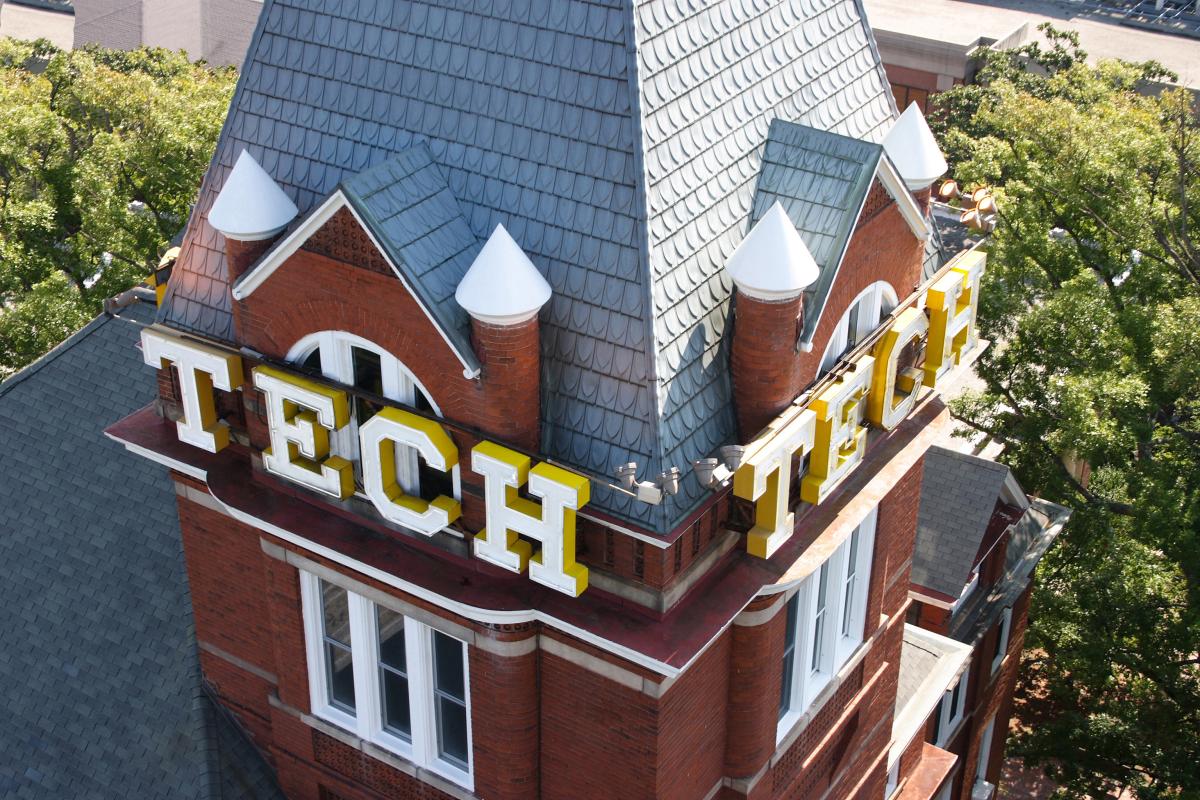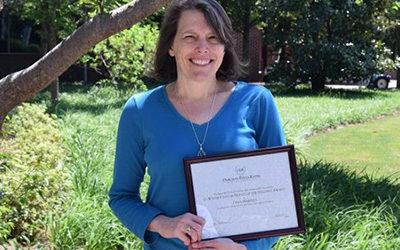
It's an unfortunate reality that there are more than half a million homeless people living in America and more than 7,000 of them living in Atlanta. While it would be nice to think homelessness isn't an issue at Georgia Tech, that isn't the case.
This month the CoE Cares Spotlight is stepping outside of the College of Engineering to talk to Homeless Student Liaison Dana Hartley, who is also the undergraduate coordinator for the School of Earth and Atmospheric Sciences. For the past year she has been working quietly to assist students struggling with homelessness in any way she can. Here is what she had to say about the struggles some of our students are facing.
How did you end up at Georgia Tech and how long have you been here?
I started at Tech as a professor in Earth and Atmospheric Sciences in 1993, so I've been here for over 20 years. I left for a few years and came back and started doing the undergraduate program. Then eventually I was director of undergraduate studies for the campus for a while, and then I came back here to EAS. Doing those campus-wide things gave me a broader feel for the campus and that has helped a lot in this role. My father is a Tech grad(aerospace engineering), so when I was getting job offers there were some significant suggestions from him that this would be a good place to come. I was born here in Georgia but I grew up in California. I always had a strong attachment to Georgia Tech so I was happy to come here.
How did you get involved with helping homeless students?
I'd heard that foster kids get dropped off at homeless shelters when they turn 18. That made me think that I could hopefully create a scholarship or something for students who came through the foster system. Then a couple years ago I read an article about a Tech alumnus helping foster children plan for college. I realized I could help work with them to get them through college. He had started a non-profit- the Orange Duffle Bag Initiative- to work with both foster care and homeless students.
I worked with the University System of Georgia to set up contacts at all of the institutions to help these students. As we looked into it we realized that we don't have many known foster care students coming into Georgia Tech- maybe one or two per year, and they generally get the Tech Promise which is a huge help. So we did lots of outreach and identified things we could do to help homeless students.
It's very rewarding. I want to help kids get through college, and where you hear about some of their survival issues it really makes you want to help. College is hard enough without those extra issues, and if you can provide some relief for those issues it makes a huge difference for the students.
Is there a certain type of student at Tech who struggles with homelessness? Are they local, international?
We thought that there might be a specific demographic makeup of homeless students, but there's not. If anything, when this started we may have expected it to be more common among international students, but it really isn't. It's all over the map. Thankfully we don't have a lot of homeless students on campus. They do exist though and it's a serious problem for those who are facing it. The opening of Klemis Kitchen has helped bring people to us before their situations got really severe. That has been very helpful.
Sometimes these students are homeless because of an unexpected bad situation. Maybe there was a fire in their building, or they broke up with a significant other. A bad roommate situation, financial hardship- there are a lot of things that can cause a temporary situation that is still very uncomfortable. It happens and we've been able to help a lot of them.
How many students use the services you offer, and what are those services?
The main three services are Klemis Kitchen, which provides food on an as-needed basis, Campus Closet, which loans professional-looking clothing to students who have upcoming job interviews or presentations, and an emergency interest-free loan fund run through the office of the dean of students. We have about 50 students who use Klemis Kitchen. We don't have numbers on how many use Campus Closet or the emergency loans, but we know they are used regularly and that they make a big difference. I only have a handful of homeless students at any one time, which I'm thankful for. If there are more we would certainly like to know about them, but it's not a large number.
Is homelessness generally a short-term problem for students or are there students who have been without a home for an extended period?
We have had students in both situations. There is a wide range of circumstances that we come across and we work with them to help them find solutions. It's difficult to go into detail about that without identifying individuals, so we'll leave it at that. But we do have means to help students, whether their situation is temporary or more long term. I also keep a supply of towels, blankets, toiletries, and other basic items that I can provide to students.
We have an image in our mind of what it means to be homeless and the reality is very different. It's much more transitory, and it may be impacting people you know without even realizing it. It's very fluid. Many of them at least have access to buildings, but they're basically just sleeping someplace. It's not comfortable. I tend to find out about more situations when the weather gets cold.
How do you find the students who need help, or do they find you?
I have some wonderful students helping me look into ways we can get the word out and help these students. Generally it's all word of mouth. Somebody hears about a situation and suggests the student go to the dean of students and then he connects them with me, and we try to help them improve their situation.
Is there a standard process for helping the students or does it vary from student to student?
There's not a specific process. It's actually very personal. I really want to know what's going on, and the more details they share with me the more I can help them. They usually have a lot of fear about their situation, and once I know what that situation is we can work on a plan to get them set up safely and comfortable with food so they can deal with classes and their student life in a healthy way.
Kennesaw State has had a program for homeless students for the last four years, and the person who runs it is in the counseling center and has a social work background. What I've learned from her is that a lot of the time the best thing to do is to help them set up for the future. Sometimes they have the resources and don't know how to use them. It's about helping them understand their options and working with them to help them feel confident. They need to know there's support and a community that's here for them.
How long have you been working on these projects?
Klemis Kitchen opened in February. I've been officially working with the homeless for a year now, but I've been working on this process for about three years. I feel like the kitchen brought more people forward since we have something meaningful we can offer to them. If a student wants to use that service they can contact me or the dean of students, John Stein, and we can give them access. We do meet with them first, because we not only want to help them with where they're at, but also make sure they're going in the right direction. This isn't going to magically disappear without planning.
When you're in the moment of crisis, survival can sometimes be all that you can put your energy towards, so we're able to help them look a little forward.
How can staff members and faculty help?
Klemis Kitchen can take non-perishable donations. They also work with Dining Services to use unused food that's prepared by students or staff and they can always use volunteers (you can sign up here). 75% of that food goes to local shelters and the other 25% stays on campus in a freezer. Right now the room that it's in is one that can be accessed by Buzzcard, which makes it easy for them. They can get what they need and take it. It's not the most inviting space, so we're working with a graduate who is an interior designer to make the space a little more friendly. Students do like the non-perishables though, and they take them. We're looking at making the space more inviting, and we may be able to use staff volunteers for that. You could also help prepare the food through GT Dining.
Staff can donate un-expired non-perishable food, as well as money. It's one of the options in the Georgia Tech Roll Call, called "No GT Hunger." With Campus Closet suits and business clothes are always needed. They welcome donations. You can email them at gtcampuscloset@gatech.edu for details.
